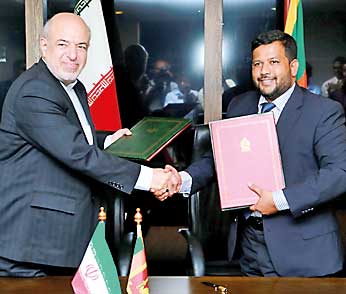Tuesday Feb 17, 2026
Tuesday Feb 17, 2026
Friday, 26 February 2016 00:28 - - {{hitsCtrl.values.hits}}
The 11th round of Iran-Sri Lanka trade talks wrapped up successfully on 24 February in Colombo. The first trade talks to be held with Sri Lanka by a post-sanctions Iranian administration, the tightly-scheduled one-day Colombo sessions deliberated on a gamut of critical issues that spanned from trade and energy to mining, culture and health.
“The five committees completed their work based on cooperation efforts of JCEC. The presence of the private sector in the formulation of articles is very effective,” declared Iranian Energy and Water Minister Hamid Chitchian yesterday in Colombo.
Chitchian was delivering his closing remarks at the conclusion of the 11th Joint Commission for Economic Co-operation (JCEC) session at The Kingsbury Hotel, Colombo. Joining the Department of Commerce organised 11th JCEC’s closing session were Iranian Ambassador to Sri Lanka Mohammed Zaeri Amirani, Minister of Industry and Commerce Rishad Bathiudeen, Finance Minister Ravi Karunanayake, Ministry of Industry and Commerce Secretary T.M.K.B. Thennakoon and DG Commerce Sonali Wijeratne, among others.
The 24 February JCEC’s minutes were signed last morning at the Ministry of Industry and Commerce and exchanged by Chitchian and Bathiudeen.
“I am glad to witness the exchange of minutes of 11th JCEC in Colombo. The five committees completed their work based on cooperation efforts of JCEC. The areas of cooperation discussed between both sides include banking and investments, trading, standards, customs and economic cooperation, oil, energy and water, health, science and culture, and other mutually beneficial areas of two sides. The presence of the private sector in the formulation of articles is very effective. The agreed items are based on the political will of both sides as well as previous bilateral experience of both sides. I and my team thank the Minister Bathiudeen and his Department of Commerce for the great hospitality extended to us during this visit.”
According to the Department of Commerce, total trade between the two countries surpassed $ 1 billion in 2008 for the first time, then decreased to $ 162 m in 2015 due to unconditional decrease of imports from Iran, especially on importation of petroleum oil. The major Sri Lankan product in the exports of Iran is tea, taking 83% of the total exports in 2015.
Bathiudeen stressed on the historic goodwill between both countries and said: “I understand that this session has been able to lay the foundation for some new MOUs that are of importance to both countries. I am delighted to note that your side has agreed to provide technical co-operations relating to many fields. I congratulate both delegations for their hard work and successful outcomes achieved during a short period of time.
“As I mentioned in my opening statement, I would like to stress the importance of bilateral trade relations particularly relating to re-visiting the Preferential Trade Agreement tariff schedules to identify opportunities to expand exports from Sri Lanka which has been mainly limited to tea. I believe that the MOU proposed by Sri Lankan side on tea industry at this JCEC will garner more opportunities for establishment of Ceylon Tea identity in the Iranian market, subject to the acceptance by people of Iran. We call for Iranian investment and joint ventures in the industrial sectors, and partner with the economic prosperity and reforms of Sri Lanka as per the vision of President Maithripala Sirisena and Prime Minister Ranil Wickremesinghe.”
Chitchian is leading a 30 member public and private sector delegation to the 11th JCEC in Colombo.